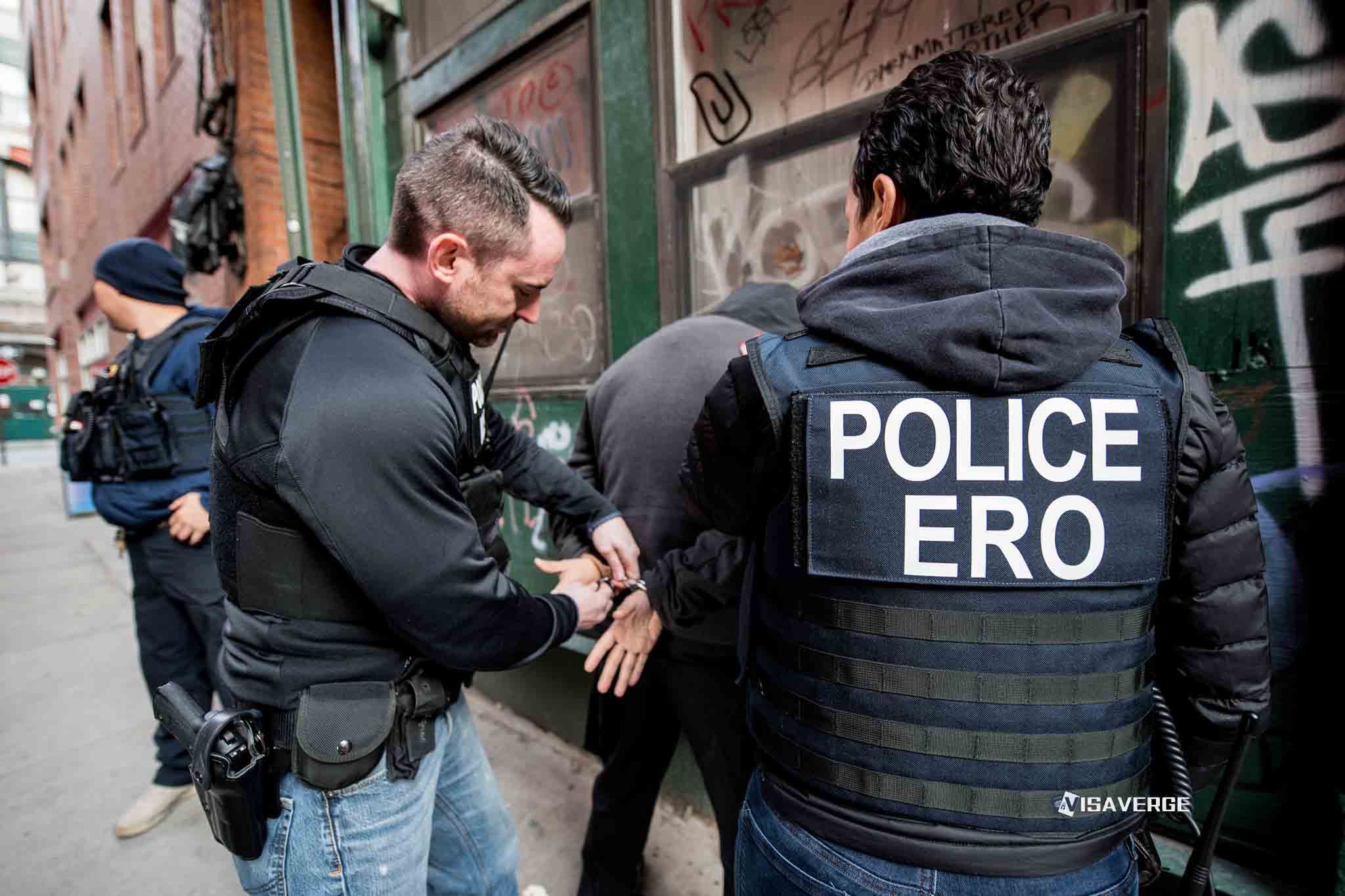Key Takeaways
• 2025 court ruling: deporting a mother is not ‘cruel and unusual punishment’ under the Eighth Amendment.
• Trump’s 2025 immigration policies increase deportations, suspend humanitarian programs, and restrict birthright citizenship.
• Deportations continue despite family separation, medical hardships, and limited legal recourse for affected immigrants.
Summary of the Court Ruling and Effective Date
A recent court ruling in the United States determined that the deportation of a mother does not constitute “cruel and unusual punishment” under the U.S. Constitution. This decision, issued in early 2025, comes at a time of sweeping changes to immigration enforcement and policy under President Trump’s second term, which began in January 2025. The ruling is already in effect and is shaping how immigration authorities and courts approach deportation cases involving parents and families.

This legal update provides a comprehensive overview of the court’s decision, the background and reasons behind it, the specific aspects of law affected, the implications for different groups, a comparison with previous legal standards, and the expected timeline for implementation. The analysis also includes practical guidance for individuals and families who may be affected by these developments.
Background and Reasons for the Court Ruling
The case at the center of this ruling involved a mother facing deportation from the United States. Her legal team argued that removing her from the country would amount to “cruel and unusual punishment,” a protection guaranteed by the Eighth Amendment of the U.S. Constitution. This argument was based on the severe impact deportation would have on her and her children, including potential family separation and hardship.
However, the court rejected this claim, finding that deportation, even when it results in family separation or hardship, does not meet the legal threshold for “cruel and unusual punishment.” The court’s reasoning relied on established legal precedents in both U.S. and Canadian law. In particular, courts have historically distinguished between criminal penalties and civil immigration enforcement actions. Deportation is classified as a civil matter, not a criminal punishment, and therefore does not trigger the same constitutional protections.
The court also noted that while deportation to a country where an individual faces torture or the death penalty could “shock the conscience” and potentially violate other legal protections, the act of deportation itself is not inherently cruel or unusual. This distinction is important because it sets the boundaries for what kinds of immigration enforcement actions can be challenged on constitutional grounds.
Affected Aspects of Immigration Law
This ruling directly affects how courts interpret the Eighth Amendment in the context of immigration enforcement. The key aspects of law impacted include:
- Eighth Amendment Protections: The decision clarifies that the constitutional ban on “cruel and unusual punishment” does not apply to deportation proceedings, even in cases involving parents or vulnerable individuals.
- Family Separation: The ruling allows immigration authorities to continue deporting parents, including mothers, even if it results in the separation of families with U.S. citizen children.
- Due Process Claims: While the court did not address every possible due process argument, the decision narrows the grounds on which deportation can be challenged in federal court.
- Humanitarian Programs: The ruling comes as the Trump administration has ended or suspended several humanitarian immigration programs, further limiting relief options for affected individuals.
For more information on the Eighth Amendment and its application, readers can visit the U.S. Courts official website.
Implications for Different Groups
The court’s decision, combined with recent policy changes, has far-reaching consequences for several groups within the immigration system:
1. Immigrant Families
- Family Separation: Parents facing deportation can be removed from the United States even if their children are U.S. citizens. In April 2025, two families, including three U.S. citizen children (ages 2, 4, and 7) and a pregnant mother, were deported under circumstances where they were held without access to legal counsel.
- Medical Hardship: There have been documented cases where children with serious medical conditions, such as cancer, were deported without necessary medication.
- Lack of Legal Access: Families have reported being held incommunicado, unable to contact lawyers or loved ones before deportation.
2. Vulnerable Populations
- Pregnant Women, Infants, Elderly, and Sick Individuals: Protections for these groups in immigration custody have been scaled back. This means that even individuals with serious health concerns may face deportation without additional safeguards.
- Refugees and Asylees: The suspension of the U.S. Refugee Admissions Program (USRAP) and the pause in green card processing for approved refugees and asylees have left many in legal limbo, unable to secure permanent status or reunite with family.
3. U.S. Citizen Children
- Deportation of Citizen Children: In some cases, U.S. citizen children have been deported alongside their non-citizen parents, raising questions about their rights and well-being.
- No Opportunity for Parental Decision-Making: Advocates report that mothers have not been given the chance to decide what is best for their children before removal.
4. Legal and Advocacy Communities
- Limited Legal Recourse: The ruling restricts the ability of lawyers and advocates to challenge deportations on Eighth Amendment grounds, narrowing the scope of possible legal defenses.
Comparison with Previous Law and Practice
Before the 2025 Ruling:
- Courts generally recognized deportation as a civil, not criminal, process.
- Some humanitarian programs and prosecutorial discretion allowed for relief in cases involving family unity or vulnerable individuals.
- Legal challenges based on “cruel and unusual punishment” were rarely successful, but advocates continued to raise them in especially severe cases.
After the 2025 Ruling:
- The court has reaffirmed and strengthened the distinction between civil deportation and criminal punishment.
- The decision aligns with Canadian jurisprudence, which holds that deportation is not inherently cruel or unusual unless it exposes individuals to torture or the death penalty.
- Relief options based on family unity or humanitarian concerns have been further reduced by recent executive actions.
Key Policy Changes Since January 2025:
- Executive Order 14159: Issued on January 20, 2025, this order directed a major overhaul of immigration enforcement, increasing deportations and limiting relief.
- Restriction of Birthright Citizenship: Another executive order attempts to restrict birthright citizenship for children born to mothers without lawful status if the father is not a U.S. citizen or lawful permanent resident.
- Termination of Humanitarian Programs: The CHNV Parole Program for nationals of Cuba, Haiti, Nicaragua, and Venezuela was terminated, affecting over 532,000 people.
- Suspension of Refugee Admissions: The USRAP was suspended indefinitely, though a federal judge has since ordered it to restart.
- Pause on Green Card Processing: USCIS was instructed to pause green card applications for approved refugees and asylees.
According to analysis by VisaVerge.com, these changes represent one of the most restrictive periods in recent U.S. immigration history.
Implementation Timeline
The court ruling is already in effect and is being applied in ongoing and future deportation cases. The broader policy changes under the Trump administration have been rolled out as follows:
- January 20, 2025: Executive orders issued, immediately impacting enforcement priorities and relief programs.
- January 27, 2025: Suspension of the U.S. Refugee Admissions Program.
- March 25, 2025: USCIS pauses green card processing for certain refugees and asylees.
- April 24, 2025: Termination of the CHNV Parole Program.
- May 5, 2025: Launch of the voluntary departure program, offering $1,000 stipends and free airline tickets to undocumented immigrants who agree to leave the country.
These measures are being implemented rapidly, with little advance notice to affected individuals or advocacy groups.
Expert Analysis and Stakeholder Perspectives
Legal experts, advocacy organizations, and lawmakers have raised serious concerns about the impact of these developments:
- Teresa Reyes-Flores of the Southeast Dignity not Detention Coalition described recent ICE actions as a “blatant violation of due process and basic human rights,” highlighting the lack of access to legal counsel and the rushed nature of deportations.
- Gracie Willis from the National Immigration Project called the actions “horrifying and baffling,” noting that families have been “ripped apart unnecessarily” and that mothers were denied the chance to make decisions for their children.
- Senator Durbin (D-IL), former chairman of the Senate Judiciary Committee, expressed “serious concerns about transparency, accountability, and the humane treatment of detained individuals.”
- The New York City Bar Association has tracked the administration’s actions, warning that they “test the limits of executive power.”
These perspectives underscore the human cost of the current enforcement climate and the limited legal avenues available to those facing deportation.
Practical Guidance and Next Steps
For individuals and families affected by these changes, it is important to:
- Seek Legal Advice Immediately: If you or a loved one are facing deportation, contact a qualified immigration attorney as soon as possible. Legal options may be limited, but timely action is critical.
- Know Your Rights: Even with the new ruling, individuals in removal proceedings have the right to a hearing before an immigration judge and the right to appeal certain decisions. For more information, visit the U.S. Department of Justice’s Executive Office for Immigration Review.
- Prepare Documentation: Gather all relevant documents, including proof of family relationships, medical records, and evidence of ties to the United States.
- Monitor Policy Changes: Immigration law and policy are changing rapidly. Stay informed through reputable sources and official government websites.
- Consider Humanitarian Relief: While options are limited, some forms of relief may still be available, such as asylum, withholding of removal, or protection under the Convention Against Torture. Consult with an attorney to explore eligibility.
Conclusion and Future Outlook
The recent court ruling that deportation of a mother does not amount to “cruel and unusual punishment” marks a significant moment in U.S. immigration law. Combined with aggressive enforcement actions and the rollback of humanitarian protections, the decision has created a challenging environment for immigrant families, vulnerable individuals, and their advocates.
Looking ahead, the administration’s policy blueprint, known as Project 2025, calls for even more restrictive measures, including the elimination of relief programs for Dreamers and Ukrainians, the repeal of all Temporary Protected Status (TPS) designations, and expanded use of E-Verify. These changes are likely to result in:
- Longer wait times for immigration applications
- Stricter qualification rules for all immigration benefits
- Higher fees for applications and petitions
- Continued aggressive enforcement and deportations
Ongoing court challenges and advocacy efforts may shape the ultimate impact of these policies, but for now, the legal landscape remains uncertain and highly restrictive.
For official updates and resources, visit the U.S. Citizenship and Immigration Services (USCIS) website.
By understanding the current legal and policy environment, affected individuals and their families can take proactive steps to protect their rights and plan for the future.
Learn Today
Eighth Amendment → A U.S. constitutional provision banning cruel and unusual punishment in criminal cases.
Deportation → The legal process of removing a non-citizen from the United States.
Civil vs. Criminal → Distinction where deportation is civil, not a criminal punishment triggering constitutional protections.
USRAP → United States Refugee Admissions Program, responsible for refugee resettlement efforts.
Executive Order → An official directive from the U.S. president affecting laws or administrative practices.
This Article in a Nutshell
A 2025 court ruling declared deportation of mothers as civil, not cruel punishment. New policies increase deportations despite family and humanitarian concerns, affecting vulnerable immigrants, refugees, and citizen children amid limited legal defenses and rising enforcement under President Trump’s administration.
— By VisaVerge.com








